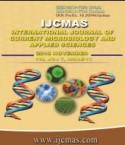


 National Academy of Agricultural Sciences (NAAS)
National Academy of Agricultural Sciences (NAAS)

|
PRINT ISSN : 2319-7692
Online ISSN : 2319-7706 Issues : 12 per year Publisher : Excellent Publishers Email : editorijcmas@gmail.com / submit@ijcmas.com Editor-in-chief: Dr.M.Prakash Index Copernicus ICV 2018: 95.39 NAAS RATING 2020: 5.38 |
Soybean has great potential as an exceptionally nutritive and very rich protein food, which is one of the five most important oil seed crops of the world. Over hundreds of pathogens are known to affect soybean, of which 66 fungi, six bacteria and eight viruses have reported to be associated with soybean seeds. In India, losses due to various diseases are estimated as 12% of total production. Host plant resistance is an economical as well as desirable component in the management of seed-borne as well as air-borne diseases. Since, pod blight complex disease is caused by Colletotrichum truncatum (Schew.) Andus and Moore, Colletotrichum gloeosporoides (Penz.) Penz. and Sac. and Rhizoctonia bataticola (Taub.) Butler is one of the emerging threat to soybean industry in recent years, identification of genotypes that can resist or tolerate the seed-borne/air-borne infections during later stages of crop growth are useful in minimizing yield loss due to the disease as well as reducing primary inoculum. The experiment on screening of available genotypes has taken under natural epiphytotic condition at MARS, Dharwad during kharif of 2016 and 2017. Out of 235 entries screened against pod blight disease complex of soybean in both the seasons of kharif 2016 and 2017, None of them were immune or absolutely resistant, 1 genotype i.e. MACS 1505 showed resistant reaction to pod blight, most of the entries like RKS 18, DSb 28-3, DSb 23-2 and DSb 30-2 were moderately resistant and SL 1104, DSb 32, RSC 10-70, KDS 921, NRC 125, RSC 10-71, DS 3106, RSC 10-52, JS 20-116 are moderately susceptible in reaction. Genotypes like JS 335, KDS 726 and KDS 780 were showed susceptible reaction and three genotypes JS 93-05, Punjab 1 and Bragg are highly susceptible to disease.
 |
 |
 |
 |
 |